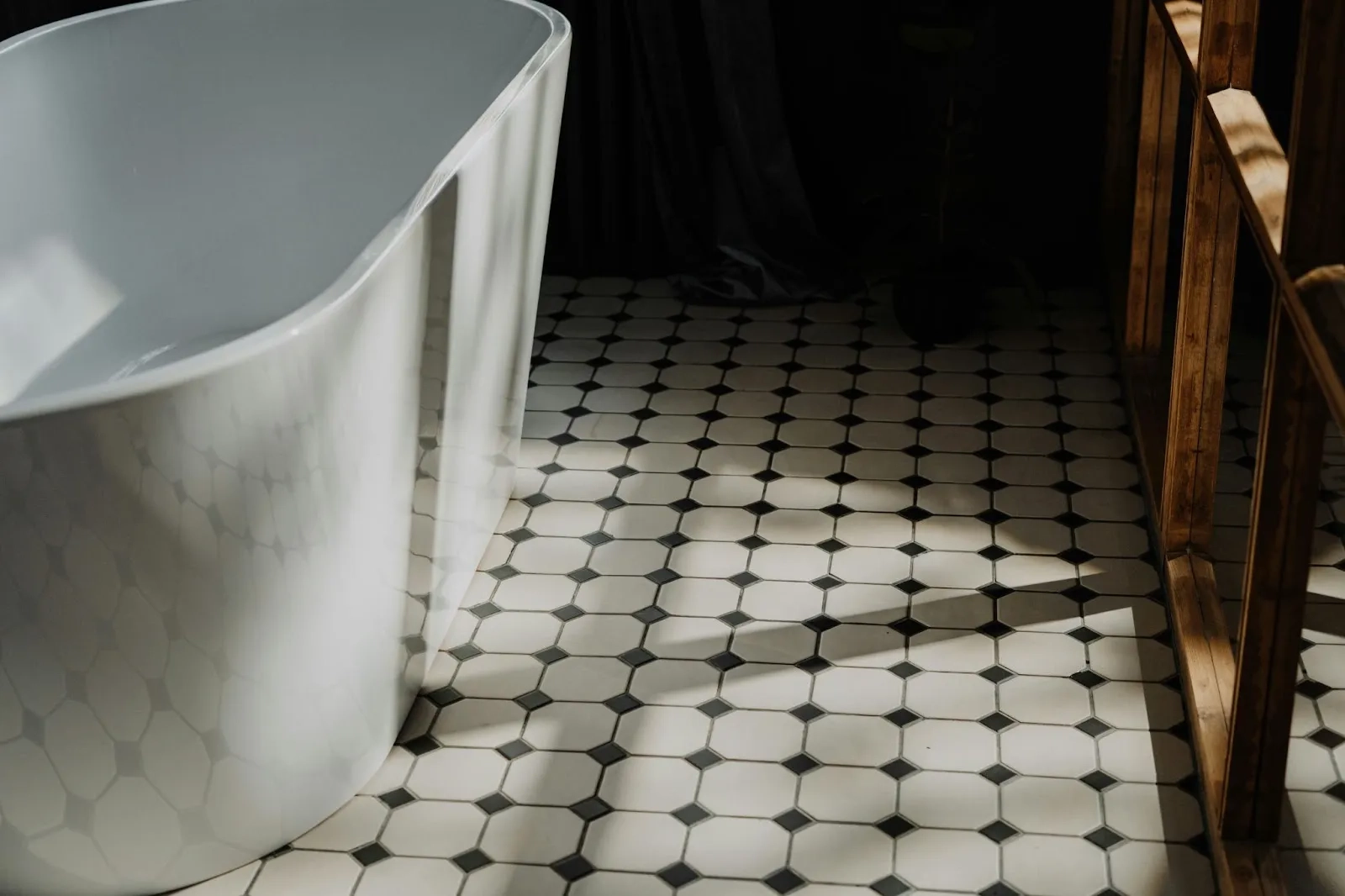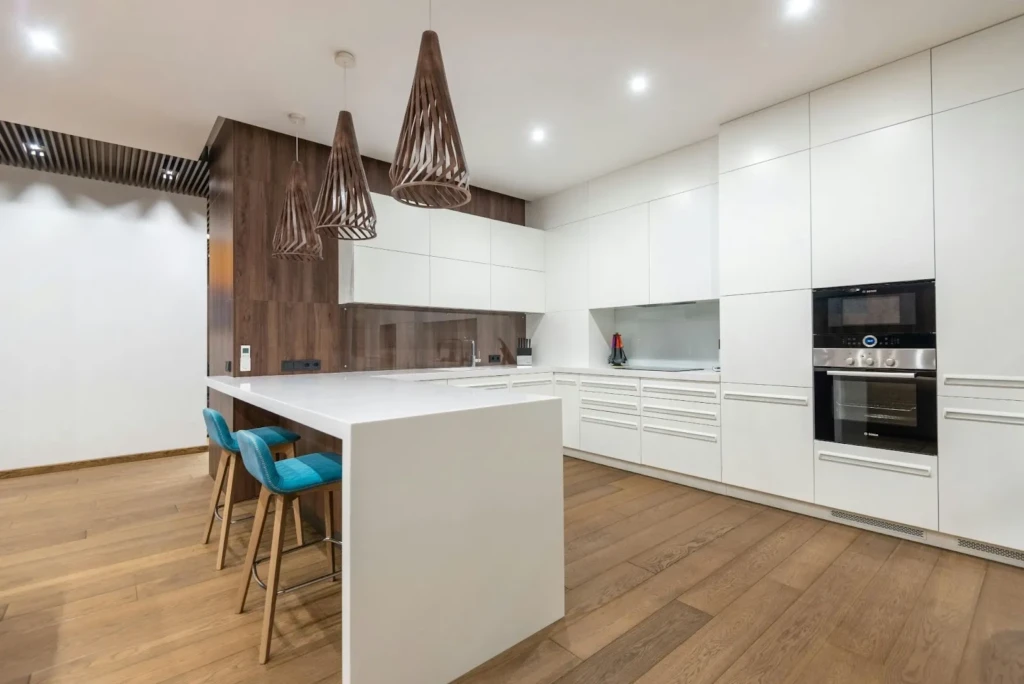Expert advice on selecting flooring that withstands high humidity, ideal for bathrooms and kitchens in Waco.
Moisture takes a toll on your home, especially your floors. From steamy showers to boiling pots on the stove, everyday life adds a surprising amount of humidity to certain rooms. If your flooring can’t handle it, you’ll see the signs – swelling, buckling, stains, or worse.
If you’ve ever dealt with floors that just couldn’t keep up, this guide is for you. Let’s talk about smart, moisture-resistant flooring in Waco, TX and how to choose what works best for your kitchen, bathroom, or laundry room.
Table of Contents
ToggleWhy High Humidity Demands Special Flooring
Moisture seeps into seams, lingers under surfaces, and causes slow but serious damage over time. In Texas homes, especially in places like Waco, humidity is often part of the daily forecast, and your floors are constantly exposed to steam, splashes, and condensation.
The trouble starts small. You might notice edges curling, tiles shifting slightly, or soft spots forming underfoot. Over time, that moisture builds up. Wood can warp or cup. Adhesives can fail. Mold and mildew may even take hold beneath the surface. That’s why moisture-resistant flooring is essential.
What Happens When You Choose the Wrong Flooring
Let’s say you install regular hardwood in your bathroom because it looks amazing. A few months in, you notice it’s beginning to shift. Gaps appear. You might even spot grayish mold creeping around the edges. That beautiful wood? It’s not made to take the daily heat and humidity.
Even some vinyl options can fall short if they’re not installed properly or aren’t rated for wet areas. Grout in tile flooring can crack if it’s not sealed well, and that opens the door for water damage underneath.
Moisture issues aren’t just cosmetic. They can lead to subfloor deterioration, create a breeding ground for bacteria, and significantly reduce the durability of your flooring. All that can lead to expensive repairs or worse, a complete redo.
Best Flooring Options for Humid Areas
Thankfully, there are several flooring options that can stand up to Waco’s humidity, and they don’t make you compromise on looks. At the top of the list are vinyl, tile, and engineered wood – all of which you can find locally and confidently use in moisture-prone areas.
Vinyl flooring is a real workhorse in bathrooms, kitchens, and laundry rooms. It’s completely waterproof, incredibly durable, and comes in styles that mimic everything from rustic wood to sleek stone. Its cushioned feel and low-maintenance upkeep make it a popular choice for active households.
Ceramic or porcelain tile is another great option. Not only is it water-resistant, it’s practically waterproof when installed correctly. Tile works exceptionally well in full bathrooms and high-traffic areas where standing water is common. Plus, with modern tile designs, you can get the look of wood, marble, or concrete without the maintenance headaches those materials can bring in humid conditions.
Engineered wood might surprise some people as a high-humidity contender, but it’s a more stable alternative to solid hardwood. The multi-layered design helps it resist warping and shrinking better than solid wood. While it’s not the best choice for full bathrooms, it can work well in powder rooms or kitchens where moisture levels are lower but still a concern. Just be sure to follow manufacturer guidelines and keep water cleaned up quickly.

What to Avoid in Moisture-Prone Rooms
It’s tempting to use the same flooring throughout your home for a cohesive look, but some materials just don’t belong in high-moisture spaces. Take solid hardwood for example. While undeniably attractive, it doesn’t handle humidity well and is prone to damage in moist environments. It absorbs water easily, which causes expansion and long-term warping.
Standard laminate flooring bathroom also struggles in wet spaces. Even a small amount of moisture can cause the core to swell and break down. Carpet, while cozy, holds onto moisture and becomes a breeding ground for mold in damp environments. While some budget-friendly peel-and-stick options may seem like a quick fix, they often fail when exposed to steam or spills.
Even the right materials can run into problems if they aren’t installed properly. Gaps, poor sealing, and a lack of underlayment can all compromise how a floor handles humidity. It’s worth taking the extra time and care during installation to ensure your flooring performs as expected.
Tips for Long-Term Durability in High-Humidity Zones
To get the most life out of your flooring in humid rooms, a few simple precautions can go a long way.
For tile, make sure the grout is sealed and maintained regularly to keep water from seeping through. In vinyl installations, use the right underlayment and follow a waterproofing protocol around the edges of the room. Engineered wood should be acclimated before installation, and you’ll want to avoid letting any water pool on its surface for long periods.
Ventilation is key too. Use bathroom fans during showers, crack open windows when cooking, and consider a small dehumidifier in particularly muggy rooms. Moisture-resistant flooring still needs a little help staying dry, especially in high-use areas.
Also, stick to recommended cleaning methods for your flooring type. Using too much water while mopping can defeat the purpose of having a moisture-resistant flooring solution. Use a damp mop and make sure you’re using a cleaner made for your specific material.
Conclusion
Humidity is just part of life in Texas, but it doesn’t have to ruin your floors. Whether you’re remodeling a bathroom, updating your kitchen, or giving your laundry room a fresh start, the right moisture-resistant flooring makes a world of difference.
Vinyl and tile are clear winners for spaces that deal with daily splashes and steam, while engineered wood gives you the warmth and character of hardwood with better performance in humid conditions.
Take time to think about how you use the space, how much water it sees, and what kind of maintenance you’re willing to commit to. With smart choices and good installation practices, you can have floors that hold up and look great no matter what the Texas humidity throws at them.
Protect your home from humidity with flooring built to last. Contact Darden Building Materials and find your perfect match today.

